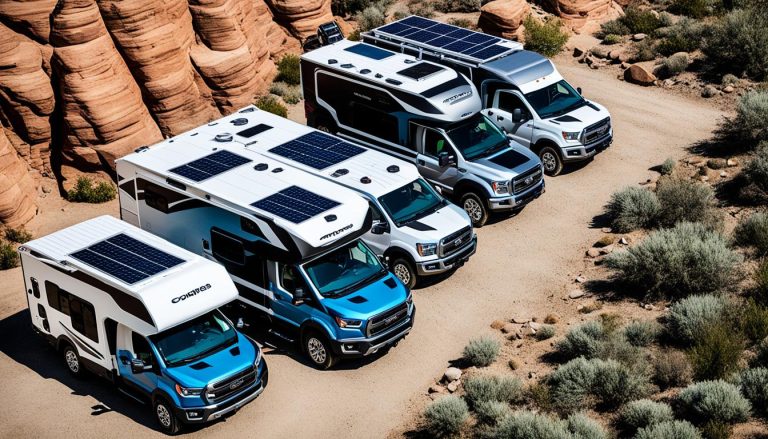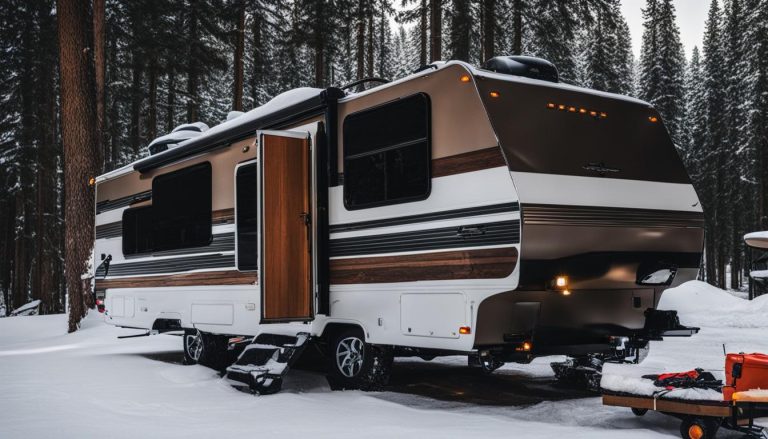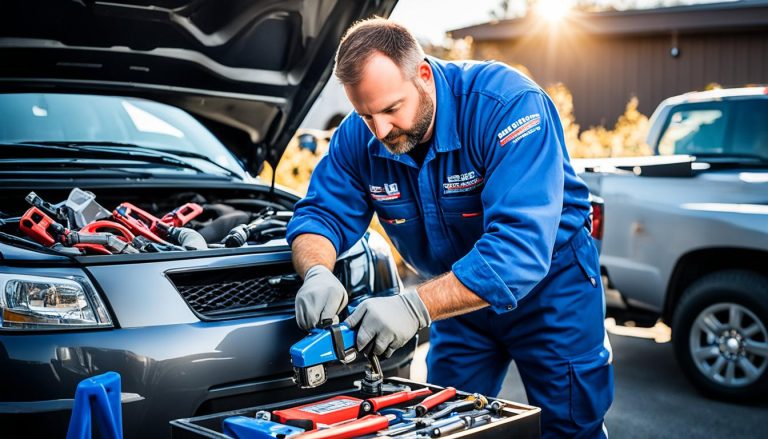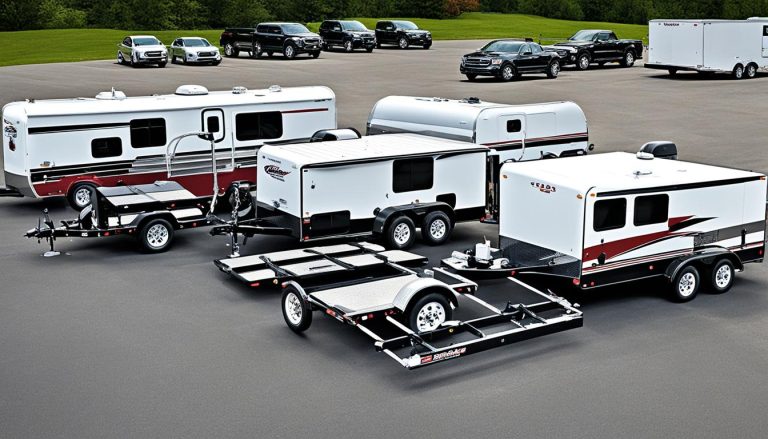Pick the Right RV for Your Vehicle’s Towing Capacity
gorvlifestyle.com and its partners may earn a commission if you purchase a product through one of our links
Embarking on safe RVing adventures begins with choosing the right RV based on towing capacity. It’s not merely about the length and amenities of the mobile abode but ensuring it harmonizes with the heft your vehicle can haul. Whether considering a cross-country jaunt or weekend escapes, one can’t overlook the significance of marrying the tow rig to the right towable RV options. From travel trailers to fifth wheels, the range is diverse, and aligning this choice with the practical RV towing capacity guide is not just prudent but necessary for the safety and enjoyment of your journeys on the open road.
Audience members seeking confidence in their selections will find solace in a transaction that takes into account the granular details of RV financing, payment structures, and state-specific fees. This comprehensive understanding ensures a personalized selection process, free of common pitfalls associated with vehicle equipment inaccuracies or neglect of trade-in valuations. Ultimately, one’s assurance in towing capacity aligns with the liberty of adventure—bolstered by informed decisions endorsed by CWI, LLC.’s hallmark of excellence.
Key Takeaways
- Understanding your vehicle’s towing capacity is paramount for selecting an RV.
- Detailed checks on trade-in values, financing, and payments ensure a secure transaction.
- Adherence to state-specific fees and ownership rights is critical for legality.
- Vehicle-equipment inaccuracies can be avoided with meticulous attention to RV specifics.
- The final RV choice should reflect personal needs, in sync with safe towing protocols.
Understanding Vehicle Towing Capacity
When preparing for an RV excursion, one of the first steps is to ensure the safety of your journey by matching the RV to the vehicle towing capacity. Understanding this concept is crucial, as it defines the maximum weight your vehicle can haul, including all necessary gear and passengers. This awareness is not just a mere suggestion but a cornerstone of responsible RVing.
Importance of Towing Capacity for Safe RVing
Towing capacity isn’t a number to be taken lightly—it’s the benchmark for road safety and enjoyable RVing experiences. As travelers pack their belongings and prepare for the road, knowing the limits of their vehicle’s abilities is paramount. Misjudging these limits can result in mechanical failures or, worse, road accidents.
Towing capacity considerations for RVs are thus not only about following the letter of the law but about ensuring that every journey you make is a story you live to tell.
How Manufacturers Determine Towing Limits
Automakers conduct extensive testing to provide accurate towing limits. These limits consider various factors, from the vehicle’s frame strength to its braking ability. Manufacturer-established towing capacities ensure that drivers can rely on their vehicle’s pulling power without risking structural or mechanical integrity.
Always consult your vehicle’s manual or manufacturer to verify its recommended towing capacity and adhere to it rigorously.
Identifying Your Vehicle’s Towing Limitations
Understanding your vehicle’s limits is essential when considering the type of RV you can safely tow. Vehicle towing capacity for RVs is often found in the owner’s manual or on a sticker inside the driver’s door. The following table highlights key information that can usually be obtained from the manufacturer to help RV owners make informed decisions about towing capacity.
| Vehicle Component | Information Provided | Relevance to RV Towing |
|---|---|---|
| Engine | Horsepower and Torque Specifications | Indicates the vehicle’s power and pull capabilities. |
| Chassis | Strength and Durability Ratings | Ensures the vehicle frame can withstand the weight of a towed RV. |
| Braking System | Brake type and efficiency | Essential for safe stopping with additional towed weight. |
| Transmission | Automatic or Manual, Gear Ratios | Affects towing potential and performance. |
| Towing Hitch | Type and Weight Rating | Ensures the hitch can manage the towed RV’s weight. |
The journey to memorable RVing adventures starts with an understanding of how crucial your vehicle’s towing capacity is. It’s about peace of mind, knowing your trip is not just possible, but also legal and safe. Remember to factor in all variables, from passenger weight to the added bulk of accessories, when matching your RV to your vehicle’s towing capacity.
Key Terms and Definitions in RV Towing
When planning for an adventure in a towable RV, understanding the weight requirements and how they affect towing is crucial. Let’s delve into the pivotal terms that highly influence safety, compliance, and the practicality of your mobile retreat.
Defining Gross Vehicle Weight (GVWR) and Gross Combined Weight Rating (GCWR)
The Gross Vehicle Weight Rating (GVWR) is a cornerstone in towable RV weight requirements. It refers to the maximum allowable total mass of a vehicle or trailer when fully loaded, as specified by the manufacturer. This encompasses the weight of the RV itself, plus all passengers, fuel, cargo, and any additional aftermarket accessories. Essentially, the GVWR is the safety boundary not to be crossed.
Similarly, the Gross Combined Weight Rating (GCWR) is the total permissible weight of your towing vehicle and the RV combined, including all cargo and passengers within both units. Staying within these specified limits is key for safe and legal towing.
Cargo Weight vs. Tongue Weight: What’s the Difference?
Cargo weight refers to the total weight of all items loaded into your RV, a critical part of managing your gross vehicle weight (GVW). Contrarily, tongue weight—the weight exerted on the hitch when a trailer is connected—is just as vital for maintaining control and stability on the road. Exceeding the recommended tongue weight can lead to adverse handling dynamics and increased wear on the vehicle.
In the case of fifth wheels, the term pin weight is used, which is similar to tongue weight but refers to the weight resting on the fifth wheel hitch. Understandably, knowing your RV’s pin weight is essential for tow vehicles equipped to pull these types of RVs.
Keeping these weights in balance is paramount for adhering to safety guidelines and ensuring a smooth ride during your travels. Below is a simplified breakdown of these crucial weights and how they pertain to a typical towable RV:
| Term | Definition | Significance |
|---|---|---|
| GVWR | Maximum weight of RV with cargo | Safety compliance and vehicle integrity |
| GCWR | Combined weight of vehicle and RV | Legal towing limit and vehicle performance |
| Cargo Weight | Weight of all items onboard | Impact on GVW and towing dynamics |
| Tongue Weight | Weight exerted on hitch | Control and stability of the RV |
| Pin Weight | Weight exerted on fifth wheel hitch | Specific to fifth wheel RVs for balanced towing |
Gearing up for a journey in your towable RV involves more than a spirit of adventure; it requires an intimate understanding of these key weights. Doing so ensures that your recreational vehicle acts as a home away from home, transporting you and your loved ones safely to each wondrous destination.
Matching RV to Vehicle Towing Capacity
When it comes to selecting an RV based on tow vehicle capacity, there are crucial compatibility steps to take for safe RVing adventures. This process ensures that your travels are not only enjoyable but also safe for you and those you share the road with. By respecting the towing specifications, you preserve the integrity of your vehicle and affirm the longevity of your RV experience.
Steps to Ensure Compatibility
First and foremost, obtain your vehicle’s tow rating from the data plate. This figure is the cornerstone of the towing setup you will establish. It is imperative to guarantee that the combined weight of your RV and any loaded contents do not exceed this tow rating. Meticulous research and planning are paramount in selecting towable RV options that align with your vehicle’s capabilities.
Selecting an RV That Your Vehicle Can Safely Manage
Equipped with knowledge of your vehicle’s towing limits, focus your search on RVs that comfortably fall within these parameters. Pay close attention to the Gross Vehicle Weight Rating (GVWR) and the Gross Combined Weight Rating (GCWR) of the RVs you consider. These figures should be well within your vehicle’s tow capacity to avoid undue stress on the engine and transmission, ensuring a reliable and safe RVing adventure wherever you choose to travel.
Choosing the right RV based on towing capacity of your vehicle (for towable RVs)
Embarking on the journey of selecting an RV based on tow vehicle capacity requires a strategic approach to ensure that your travel experiences are not only enjoyable but also safe. It’s important to thoroughly understand the weight your vehicle can manage before deciding on the perfect RV to accompany you on your adventures. This decision is not just about comfort—it’s about adhering to safety standards and legal regulations.
Consulting an RV towing capacity guide is a starting point for potential owners to align their vehicle’s abilities with the weight of the RV. Overloading your vehicle can lead to dire consequences, from decreased vehicle performance to heightened risk of accidents, which can also raise issues with insurance coverage. Therefore, it is paramount to match your tow vehicle with an RV that falls within its towing limits.
| Tow Vehicle Capacity | RV Type | Estimated Weight Range |
|---|---|---|
| 3,500 lbs | Teardrop Trailers | 1,000 to 3,200 lbs |
| 5,000 lbs | Travel Trailers | 2,500 to 4,500 lbs |
| 8,000 lbs and over | Fifth Wheels | 5,000 to 12,000 lbs |
With that in mind, choosing the best RV for towing doesn’t solely depend on the numbers—a practical test drive and examining various models specification helps in making a well-informed decision. Ensure that you’re comfortable with how the RV handles when connected to your vehicle and that visibility and vehicle control remain uncompromised.
Ultimately, the safest route towards selecting an RV is to be conservative with your vehicle’s towing capacity. Always allow for a buffer below the maximum capacity to account for any additional cargo you might bring along. This foresight not only protects you legally but also ensures that your RVing experience remains a pleasure, not a burden.
Types of Towable RVs and Their Weight Considerations
When exploring the open road, matching your vehicle to a towable RV’s weight requirements ensures a smooth and safe journey. Understanding the unique weight considerations associated with different types of RVs can aid in making an informed decision that aligns with your vehicle’s towing capacity.
Travel Trailers and Fifth Wheels: Understanding Weight Distribution
Travel trailers and fifth wheels are among the most popular towable RV options, each with distinct weight distribution characteristics. Travel trailers commonly transfer 12-15% of their Gross Vehicle Weight Rating (GVWR) to the hitch of the towing vehicle. On the other hand, fifth wheels can impose a heftier average of 20-25% onto the tow vehicle’s hitch. This variance is due to the design of fifth wheels, which connect directly over the rear axle of a truck, leading to increased stability but also greater hitch weight.
Lightweight RV Options for Limited Towing Capacity
For those with vehicles that have a more limited towing capacity, lightweight RVs may be the ideal solution. These models are designed to provide the comforts of a standard RV but at a significantly reduced weight, allowing them to be towed by lighter-duty vehicles without compromising safety. It’s crucial to consider these lighter options if your vehicle cannot handle the weight of standard travel trailers or fifth wheels.
- Ultralight travel trailers: Perfect for smaller SUVs and crossovers.
- Teardrop campers: Suited for those who enjoy minimalism without needing extensive amenities.
- Pop-up campers: Offer the convenience of a trailer without the heavy weight, making them easily towable.
By accurately matching RV to vehicle towing capacity, adventurers can embark on their travels with the confidence that their rig is up to the task. Whether you opt for larger travel trailers, deluxe fifth wheels, or compact lightweight options, understanding towable RV weight requirements plays a pivotal role in your vehicle’s performance and your overall on-the-road experience.
Selecting an RV Based on Tow Vehicle Capacity
Finding the perfect towable RV options requires meticulous attention to your vehicle’s towing capacity and the RV’s demands. This decision is key to ensuring safety and enjoyment on your travels, and every adventurer looking to hit the road with an RV should prioritize it.
Calculating Allowable Payload for Comprehensive Safety
To safely embark on an RV adventure, it is imperative to calculate the allowable payload that your vehicle can handle. This ensures that the combined weight of the RV, passengers, and cargo doesn’t exceed the Gross Vehicle Weight Rating (GVWR). The allowable payload is calculated by subtracting the vehicle’s curb weight from its GVWR. Accuracy in this step can prevent hazardous conditions and mechanical strain during your travels.
Ensuring Adequate Power for the Chosen RV
While the physical dimensions of the RV certainly matter, the Gross Combined Weight Rating (GCWR) is a crucial metric that dictates whether your vehicle’s engine has the capability to tow the RV of your choice. An engine that meets the GCWR requirements guarantees not just the mechanical well-being of your vehicle but also your peace of mind as you navigate diverse terrains.
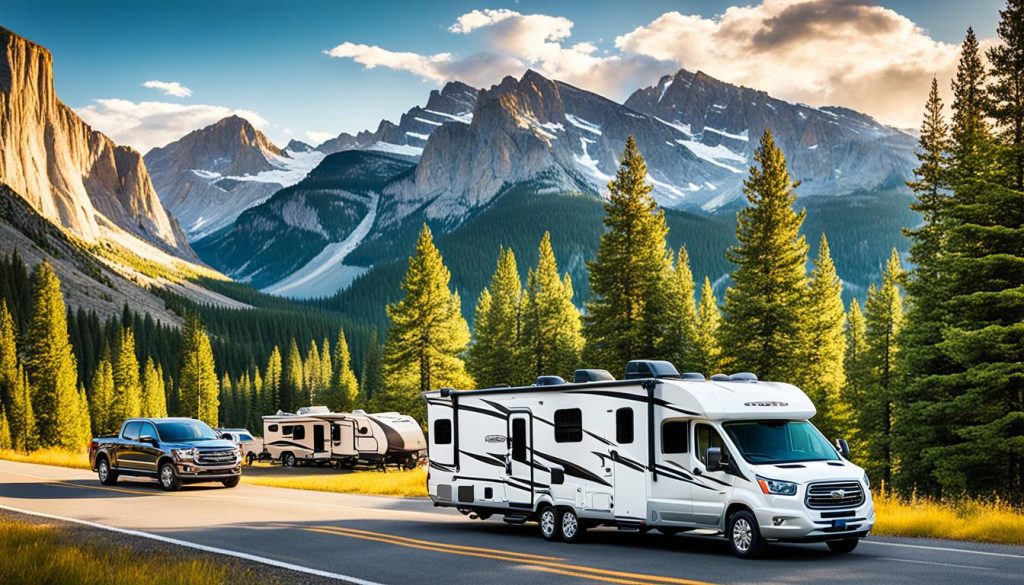
| Vehicle Model | GVWR (lbs) | Curb Weight (lbs) | Allowable Payload (lbs) | GCWR (lbs) |
|---|---|---|---|---|
| Model A | 7,500 | 4,800 | 2,700 | 15,000 |
| Model B | 9,000 | 5,500 | 3,500 | 20,000 |
| Model C | 10,000 | 6,100 | 3,900 | 25,000 |
Beyond technical specifications, safe towing also includes a series of practical checks: ensuring your RV is appropriately equipped for the weight it will carry, installing the correct towing hardware, and verifying that both the RV and your vehicle are in a prime condition for the road ahead.
RV Towing Capacity Guide and Best Practices
Embarking on the journey of choosing the right RV based on towing capacity is an exciting venture for any travel enthusiast. It allows for a seamless blend of mobility and comfort, ensuring your adventure is both thrilling and safe. Addressing towing capacity considerations for RVs upfront is vital to this end. As you gear up to hitch your home-away-from-home to your vehicle, it’s crucial to strike the perfect balance between what you need on your travels and what your vehicle can handle.
Factoring in Cargo Weight and Accessories
When it comes to loading up your RV, every item counts. From kitchen utensils to the outdoor gear tucked away in storage compartments, these weights add up, affecting your vehicle’s capacity to tow. Traveling light might be an option for the spontaneous road-tripper, but for the long-term adventurer, understanding the bulk and heft of your belongings, including any additional accessories, is non-negotiable.
Accurate Calculation of Total Towing Demands
For the precise calculation of your towing needs, it’s imperative to include the RV’s Unloaded Vehicle Weight (UVW) and Cargo Carrying Capacity (CCC) in your tally. Account for potential cargo weight and ensure that the sum total does not exceed your vehicle’s Gross Vehicle Weight (GVW). This diligence safeguards your mobility and maintains compliance with safety standards.
The table below serves as a tool to aid you in this meticulous process. Use it to cross-reference your vehicle’s specifications with your RV’s and cargo’s combined demands to guarantee that your setup is well within the safe towing capacity.
| Vehicle Specification | Description | Value |
|---|---|---|
| Vehicle Towing Capacity | Maximum weight your vehicle can tow | Specified by Manufacturer |
| RV UVW | Weight of RV without cargo or fluids | Found in RV Manual |
| RV CCC | Maximum weight of cargo RV can carry | Found in RV Manual |
| Passenger Weight | Combined weight of all passengers | Actual Weight Measurement |
| Total Cargo Weight | Weight of all belongings and accessories | Actual Weight Measurement |
| Required Towing Capacity | Safety buffer on top of total demand | 10-15% Above Combined Weight |
By taking each element into account and diligently checking against your vehicle’s towing capacity, you ensure not only a legal and secure attachment but also a peaceful mind as you travel. In pursuing the best practices in RV towing capacity considerations, the open road becomes a place of limitless potential, ready for exploration with your trusty RV in tow.
Vehicle Towing Capacity for RVs: Legal and Insurance Implications
Adventurous spirits keen on exploring the open road with recreational vehicles (RVs) must understand that the serenity of this lifestyle is built upon strict adherence to towing capacity limitations. Disregarding these can have severe repercussions, extending beyond mere safety concerns to encompass various legal and insurance issues. Awareness is crucial when packing up for your journey, as surpassing vehicle towing capacity for RVs can expose you to unexpected adversities.
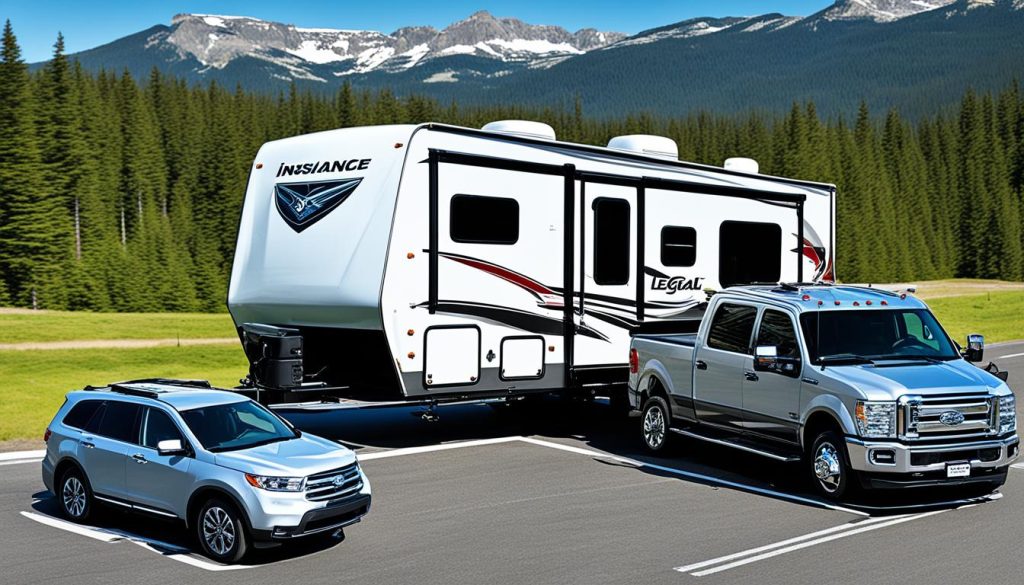
Risks of Exceeding Towing Ratings
When your escapades lead you to pack more into your RV than what your vehicle can legally tow, you are at risk of violating not just the laws of physics but also state and federal regulations. These towing capacity considerations for RVs are not mere guidelines; they are enshrined in law to protect you and other road users. Ignoring these caps can result in negligence claims, should you be involved in an accident, and perhaps more frighteningly, it can lead to insurers dismissing claims due to non-compliance with safety standards.
Ensuring Compliance with Manufacturer and Legal Requirements
Compliance with your vehicle manufacturer’s specifications isn’t just about preventing mechanical failures or optimizing fuel consumption; it’s a cardinal rule to avoid tangling with the law. Manufacturers spend considerable time and resources determining the safe towing capacity for RVs, and flouting these specifications can mean hefty fines and invalidated insurance policies. As you gear up for your RV adventures, it is imperative to crosscheck the legal and insurance implications tied to your vehicle’s towing capabilities—keeping your travels both lawful and insured.
Best RV for Towing: Considerations Beyond Weight
Finding the best RV for towing encompasses more than just understanding your tow vehicle’s capacity; it includes evaluating several features and dimensions that elevate the comfort and practicality of your travel. When selecting an RV based on tow vehicle capacity, remembering these additional facets will ensure that your RVing adventures remain both thrilling and safe.
Assessing Additional RV Features and Amenities
Aspiring RV owners should consider the array of features that each RV offers. Amenities such as slide-outs, awnings, and storage compartments can sway the overall towing experience. Making these assessments in light of the tow vehicle’s capacity ensures that your vacationing adventures are not just about reaching the destination but enjoying the journey itself.
Impact of RV Length and Height on Towing Dynamics
The length and height of an RV are critical in influencing towing dynamics. Longer RVs may require extended side mirrors for adequate visibility, while taller RVs might affect stability during windy conditions or when traversing bridges. Properly gauging these factors against the towing capabilities of your vehicle is essential for a balanced and controlled driving condition.
| RV Feature | Consideration | Impact on Towing |
|---|---|---|
| Slide-Outs | Expands living space | Increases weight and may affect balance on the road |
| Awnings | Offers outdoor protection and space | Minimal impact on weight; easy to manage |
| Storage Compartments | Allows more cargo | Can add significant weight if fully utilized |
| Extended Mirrors | Necessary for longer RVs | Improves safety by enhancing visibility |
| Stabilizing Systems | Improves towing stability | Can be crucial for taller RVs to manage wind effects |
Remember, the pursuit of the best RV for towing doesn’t merely end with a function. It’s about harmonizing the technicalities of towing capacities with the luxurious and convenient amenities that transform an ordinary outing into a cherished and safe RVing adventure.
Towable RV Weight Requirements: The Checklist
Before setting out on an adventure, it is essential to understand the towable RV weight requirements to ensure a safe and legal trip. This involves having a firm grasp on terms like gross vehicle weight rating (GVWR), and the importance of conducting a predeparture weighing to avoid straining your tow vehicle.
Predeparture Weighing for Accurate Load Assessment
Gearing up for a trip means paying close attention to the overall weight of your towable RV. The process begins by evaluating the entire set-up which includes all personal effects, onboard water, and additional gear. These predeparture checks safeguard against exceeding the specified limits of your towable RV and tow vehicle.
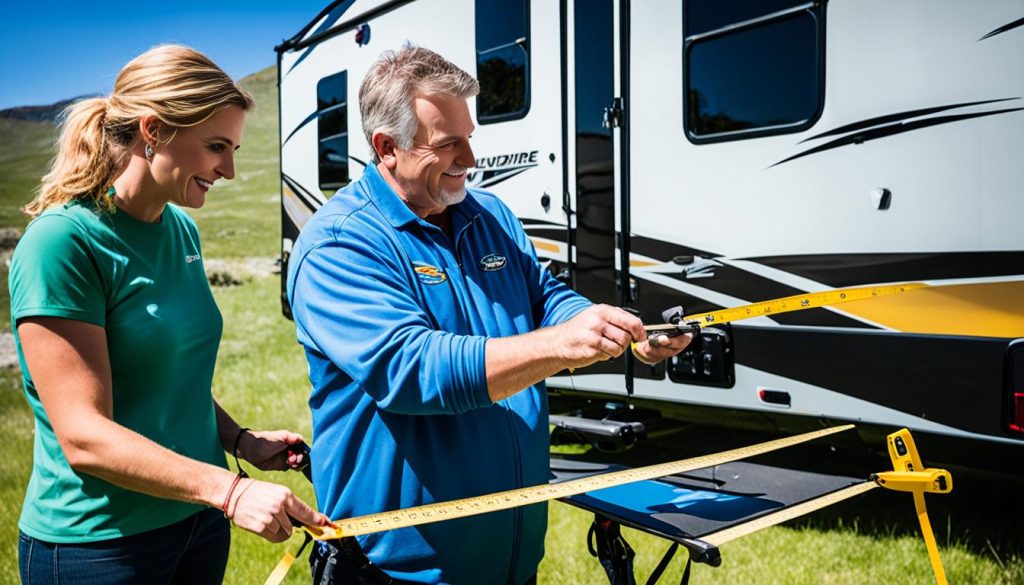
Tools and Resources for Weighing Your RV and Tow Vehicle
Ensuring you are within the weight requirements demands the right tools to accurately measure your setup. Public weigh stations are invaluable in this regard, offering precise assessments of your tow vehicle’s GVWR. Consider using specialized scales that can measure individual wheel weights for a detailed understanding of your load distribution.
| Weight Component | Description | Importance |
|---|---|---|
| Hitch Weight | The weight exerted on the hitch by the RV. | Crucial for pinpointing tongue or pin weight distribution. |
| Axle Weight | The weight supported by each axle of your RV. | Essential in preventing overloading and maintaining structural integrity. |
| Total Weight | The combined weight of the RV and tow vehicle. | Must not exceed the tow vehicle’s GVWR for optimal safety. |
Remember, these predeparture steps are not just a matter of compliance; they are about ensuring a smooth, stress-free journey where safety takes precedence. By adhering to the established towable RV weight requirements, travelers can confidently explore the open road.
Finalizing Your Decision: Selecting the Perfect RV for Your Adventures
After delving into the complexities of weights and measures, safety standards, and towing capabilities, you stand at the threshold of finalizing your RV selection – a harmonization of desire and practicality. As you steer towards the idyllic culmination of this journey, it’s imperative to seek guidance to navigate the technical terrain. The wealth of information available makes a strong ally out of an RV towing capacity guide, but the critical insights of seasoned dealers and experts illuminate the path with a beam of expertise uniquely tailored to your situation.
Consulting with Dealers and Experts
They’re not just salespeople; they are the cartographers of your RV adventure map. Consulting with dealers and experts offers a dynamic dimension to your decision-making process, allowing you to explore various models beyond the surface features. These interactions provide you with a deeper understanding of what it means to marinate in the luxury of a perfect match – when the RV’s soul aligns with the heart of your vehicle’s towing capacity. As you’re choosing the right RV based on towing capacity, their knowledge dispels doubts, ensuring no stone is left unturned in your pursuit of a seamless match.
Prioritizing Needs and Preferences in Your RV Selection
Ultimately, your RV signifies more than a vessel for travel—it articulates a lifestyle. Making the final selection is a dance of prioritizing needs and preferences against the rigid numbers of towing capacities. This is where your unique narrative intertwines with the mechanical equations of RVing. Will you lean towards an artist’s mobile studio, a family’s cozy retreat, or an explorer’s rugged chariot? Whatever shape your dreams take, ensure they align with the advice of professionals. It’s this very alchemy—consulting dealers and experts and weighing your desires within the realistic constraints—that forges your ideal adventure companion.


